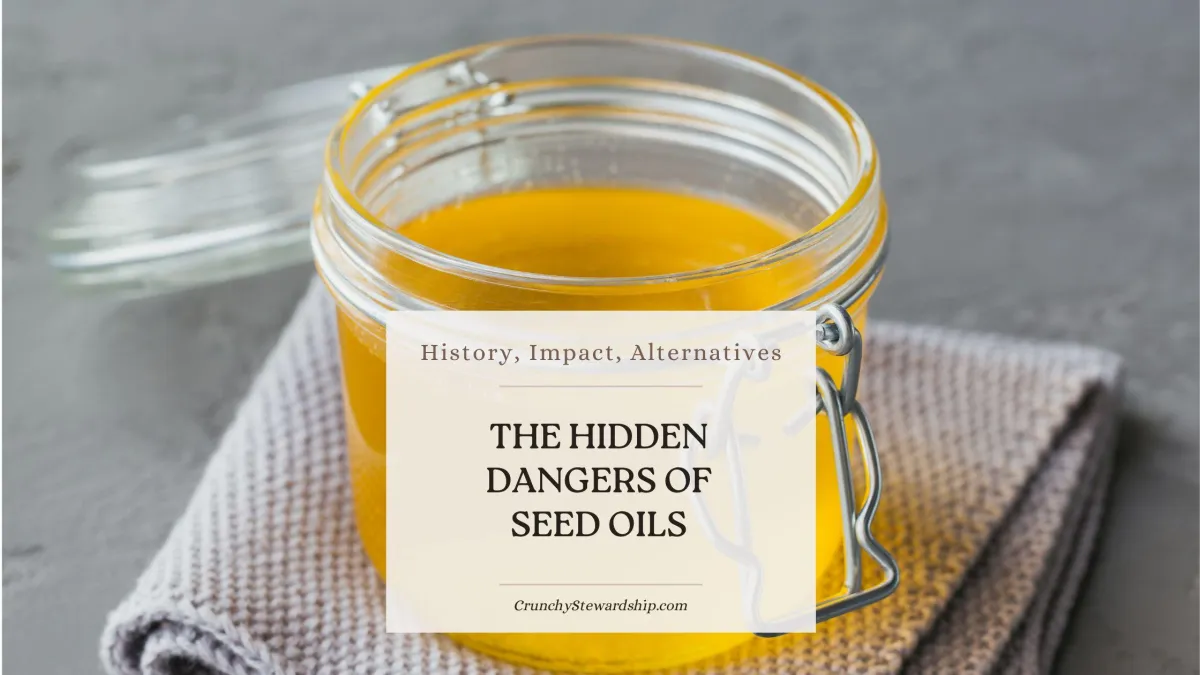
The Hidden Dangers of Seed Oils: History, Impacts, and Alternatives
The Hidden Dangers of Seed Oils: History, Impacts, and Alternatives
Understanding Seed Oils
Seed oils, often hailed as healthier cooking oils, have been a controversial topic in recent years. With more people becoming aware of their potential health risks, it’s essential to explore their history, why they might be harmful, and what healthier alternatives exist. This blog post aims to shed light on seed oils and provide guidance on making better dietary choices.
Before diving in, I should mention that I am definitely nooo expert. However, I have done my fair share of learning on this subject. One of my favorite sources to learn from is the Weston A. Price Foundation and by extension my favorite book to learn from is written by the current president, Sally Fallon Morell. Her book is called Nourishing Traditions. I’d recommend you continue to do your own research beyond this blog post, but take it as a good launching point for your own journey!
With that, here is what I have learned about seed oils…

A Brief History of Seed Oils
The story of seed oils as I see it, dates back to the World War II era when an abundance of canola oil was produced for wartime machinery in Canada. Post-war, this surplus led to canola oil being repurposed for human consumption, despite health concerns that were notably suppressed. These oils, derived from sources such as soybean, corn, and sunflower seeds, became popular because they were cheap and marketed as a healthy alternative to saturated fats like butter and tallow.
Interestingly, the American Heart Association in the mid-20th century endorsed unsaturated fats, including seed oils, as healthier options. However, this coincided with a rise in heart disease, suggesting that the shift away from natural animal fats might not have been as beneficial as once thought.
Why Seed Oils Might Be Harming Your Health
Seed oils are largely composed of polyunsaturated fats, which contain an abundance of omega-6 fatty acids. While essential in the right ratio, the typical modern diet skewed by seed oils can create an abundance of omega-6 fatty acids, resulting in inflammation and other more serious health issues. Moreover, these oils are often unstable at high temperatures, easily oxidizing and creating free radicals which contribute to chronic diseases and cellular damage.
Another concern stems from the industrial process of extracting these oils, involving high heat, heavy metals, and toxic chemicals which can further compromise their health integrity resulting in a weakened immune system. Products like margarine, processed through a procedure called hydrogenation, undergo transformations involving nickel oxide and bleaching agents before reaching your plate, yet are puffed up to be a health food!
Healthier Alternatives: Fats That Nourish
With the negative aspects (of which we only scratched the surface) of seed oils in mind, many are looking for better alternatives. Traditional fats like butter and tallow is a solid start. These are stable at high temperatures, making them optimal for cooking and supporting nutrient absorption. Other good options include:
Coconut Oil: Known for its natural antibacterial properties, coconut oil is a versatile fat that remains stable at moderate cooking temperatures.
Olive Oil and Avocado Oil: These can be beneficial when cold-pressed and minimally processed, offering healthy monounsaturated fats.
Ghee: A clarified butter, ghee is devoid of milk solids and can withstand high temperatures, making it ideal for various culinary applications.
Practical Tips for Healthier Choices
When selecting oils, look for those sold in dark glass bottles to preserve their quality by preventing light exposure and plastic contamination. Additionally, be mindful of labels—opting for single-origin products can help avoid adulterated oils mixed with undesirable ingredients.
Start small in transitioning your pantry. Begin by reading food labels more carefully and choose products that align closer with whole, unprocessed foods. Even organic processed foods contain seed oils!
A Call to Conscious Consumption
With a heightened awareness of seed oils and their impact, you can make well-informed choices that favor long-term health benefits. Transitioning away from seed oils isn’t about an immediate overhaul, but rather about making smarter, more conscious decisions incrementally.
For those interested in diving deeper into these nutritional changes, explore resources and communities that support holistic and sustainable living practices. Whether it’s joining groups dedicated to healthier diets or accessing guides on non-toxic lifestyles, every step taken is a positive move towards better stewardship of our bodies and the planet. We’d love it if you joined us over in our Facebook group, Crunchy Christian Mamas on a Budget!
